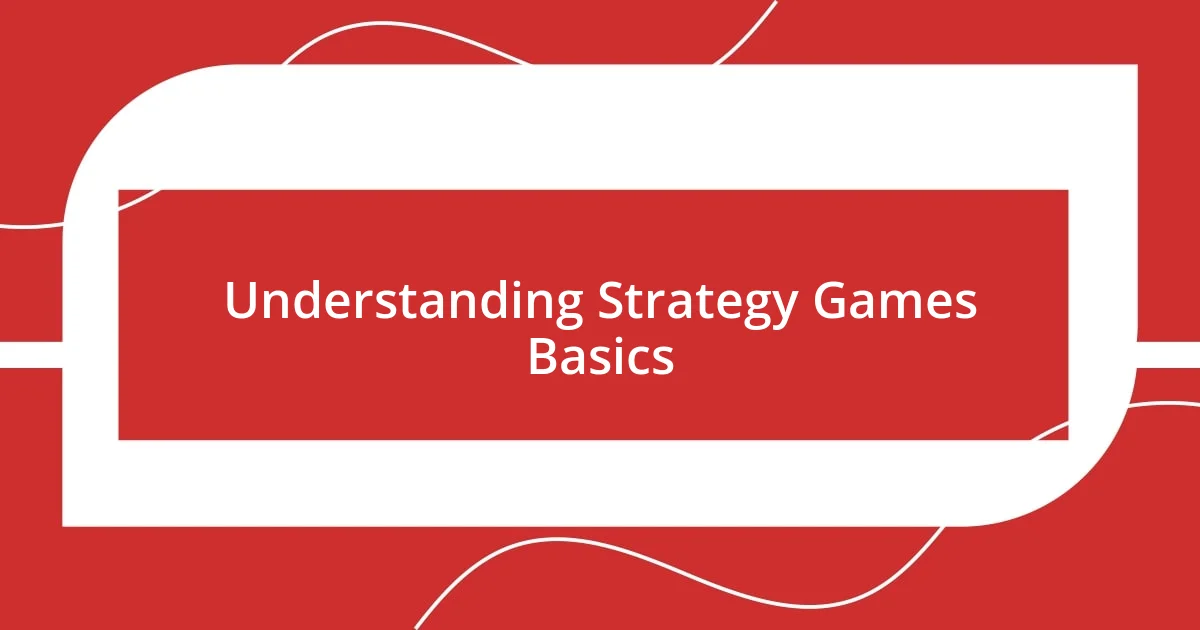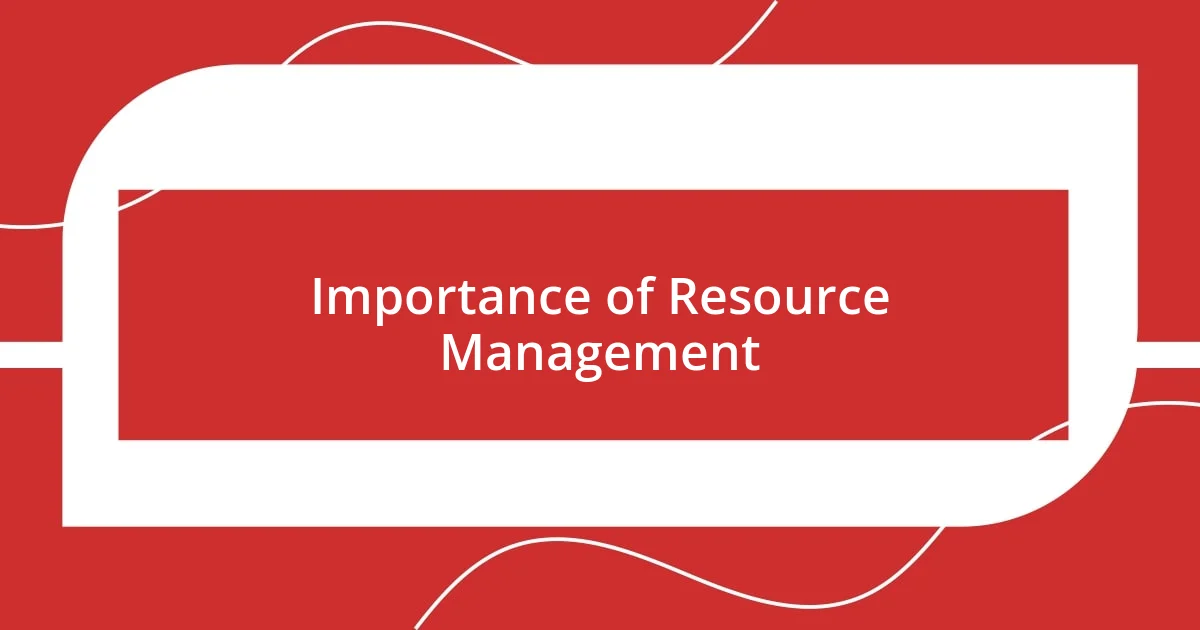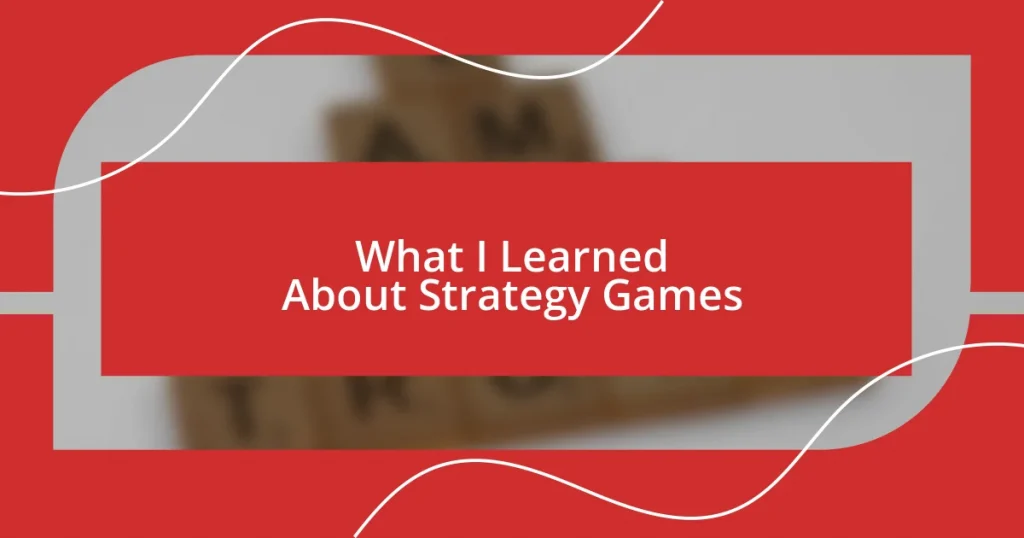Key takeaways:
- Mastering resource management is essential for success in strategy games, influencing both immediate outcomes and long-term strategies.
- Effective tactics require adaptability, as players must analyze opponents’ strategies and adjust their own approaches to overcome challenges.
- Collaborative communication and flexibility are crucial during unexpected game scenario shifts, enabling teams to navigate chaos and achieve victory.

Understanding Strategy Games Basics
When I first dove into strategy games, I was amazed by how they intertwine planning and decision-making. Each move I made felt like a puzzle piece fitting into a larger picture, and I quickly realized that understanding the basic mechanics is crucial. Isn’t it fascinating how a single choice can lead to victory or defeat?
As I played more, I discovered that the essence of strategy games lies in resource management. Whether it’s managing units, finances, or time, I often found myself weighing my options carefully. Have you ever felt that rush when executing a plan you meticulously crafted? It’s that adrenaline that keeps you coming back for more.
Additionally, grasping the various game styles—be it turn-based or real-time—shaped my approach significantly. Turn-based games felt like a chess match, where every move is calculated, while real-time challenges pushed me to think on my feet. This variety has enriched my gaming experience, allowing me to enjoy different emotional dynamics depending on the game type. Isn’t that what makes strategy games so captivating?

Analyzing Game Mechanics
Analyzing game mechanics reveals the backbone of what makes strategy games so compelling. Each mechanic contributes to the overall experience, making it crucial to understand their interactions. For example, when I first played a tower defense game, I was surprised to see how different tower placements influenced enemy paths. That moment was a vivid reminder of how essential spatial awareness and positioning are to mastering the game.
Here are some key aspects to consider when analyzing game mechanics:
- Resource Allocation: Balancing how and when to invest resources can create a decisive advantage.
- Player Choices: The consequences of choices—successful or not—can shape future strategies significantly.
- Feedback Systems: Understanding how players receive feedback on their actions can greatly improve learning and adapting.
- Game Flow: The pacing of mechanics can impact decision-making speed and the player’s emotional engagement.
- Win Conditions: Knowing how to achieve victory informs every action you take, adding layers to strategic depth.
Reflecting on these mechanics has genuinely opened my eyes to the complexity hidden beneath the surface. I remember working tirelessly to optimize my resource-gathering strategy in a civilization game, only to realize that every unit choice had a cascading effect on my overall success. Understanding these nuances not only enhances gameplay but cultivates a deeper appreciation for the art of strategy itself.

Importance of Resource Management
Resource management is the lifeblood of strategy games, and I’ve learned this lesson time and again—especially during an intense session with a city-building game. When I squandered my initial resources on extravagant structures rather than essential ones, I found myself in a bind. It was a tough moment; the thrill of rapid growth quickly turned into a desperate scramble to recover. Those kinds of experiences taught me that every resource counts and demands strategic allocation based on long-term goals rather than short-term temptations.
As I continued to immerse myself in various games, I noticed a common thread: efficient resource management often leads to more profound strategic depth. In one game, I focused too heavily on offense, neglecting my economy. The result? A well-defended opponent crushed my dreams of victory. This taught me that balancing offensive and defensive strategies with careful resource planning is crucial. Have you ever found yourself overcommitting to one aspect, only to be blindsided later on?
To me, understanding resource management not only influences the outcome of each match but also enhances my gaming experience overall. I recall a multiplayer encounter where I meticulously managed my resources, transitioning from a defensive strategy to a strong offensive push at just the right moment. The thrill of watching my efforts pay off was euphoric! It reinforced my belief that careful consideration and management of resources can transform a player’s approach and ultimately lead to triumph.
| Aspect of Resource Management | Personal Experience |
|---|---|
| Resource Allocation | Learning to balance essential needs with future goals saved me from early mistakes. |
| Long-term Planning | Focusing on remaining sustainable allowed me to set the stage for victory later in the game. |
| Balance Between Strategies | Trying to overcommit to offense exposed vulnerabilities in my gameplay. |

Developing Effective Tactics
Effective tactics are essential for navigating the complexities of strategy games. One of my memorable moments came during a match of a real-time strategy game. I initially relied on overwhelming my opponent with sheer numbers, only to realize that they had a solid defensive setup. It hit me hard; tactics aren’t just about offense. I learned that adapting my approach, studying my opponent’s strengths, and timing my attacks made all the difference. Have you ever faced a situation where your original game plan fell apart and you had to pivot quickly?
As I explored different genres of strategy games, I discovered the power of positioning and terrain. In an exhilarating turn-based battle, I placed units strategically for cover and flanking opportunities. The result? I turned the tide against a seemingly unstoppable force. It was thrilling to witness how a few well-placed moves could create openings and weaknesses in an opponent’s defense. This reinforced my belief that anticipating enemy actions—and being ready to adapt—is crucial for any tactical approach.
Adopting a mindset of experimentation has also greatly enhanced my tactical development. I remember diving into a new strategy game, where I intentionally tried unconventional tactics. While some approaches ended in failure, each defeat was a learning opportunity, allowing me to refine my methods. It’s exhilarating to realize that effective tactics aren’t just about winning; they’re about evolving as a player. What experiments have shaped your own tactical gameplay?

Learning from Competitors Strategies
Learning from competitors has been a game-changer for me in strategy games. I remember a time when I faced a particularly formidable opponent who consistently outmaneuvered me. Observing their methods closely, I spotted their effective use of deception and feints, which highlighted the power of psychological tactics. Isn’t it fascinating how watching someone else play can change your perspective on what’s possible?
One lesson that stands out is the importance of adaptability. I once found myself in a match where my rival had a unique strategy that initially threw me off balance. Instead of sticking to my own game plan, I decided to pivot and adopt some of their techniques. This not only helped me to stay competitive but also enriched my own understanding of the game. Have you ever felt inspired to change your approach because of a competitor’s skills?
In another instance, I participated in a tournament where the diversity of strategies was astounding. By paying attention to how different players tackled challenges, I learned to incorporate elements from various styles into my own gameplay. It was enlightening to see how a simple adjustment could elevate my performance dramatically. This experience drove home the fact that no matter how skilled we become, there’s always room for growth by learning from others. Isn’t that what makes strategy games so engaging?

Adapting to Different Game Scenarios
Adapting to different game scenarios feels like a dance—sometimes fluid and graceful, other times a bit clumsy. I recall a moment in a multiplayer game when the scenario shifted unexpectedly; my carefully planned assault turned into a hasty retreat as my opponent flanked me with surprising effectiveness. In that instant, the stakes soared, and I realized the importance of staying alert and flexible. Have you ever felt that surge of adrenaline when the game takes a turn, forcing you to rethink your entire strategy on the fly?
There’s something exhilarating about shifting strategies mid-game. In one instance, I was caught off guard by a sudden resource shortage that changed my game plan dramatically. Instead of despairing, I pivoted to a defensive strategy, fortifying my base and ambushing opponents who underestimated my resilience. This taught me that each game scenario doesn’t just challenge my tactics; it invites creativity in crafting new solutions. Isn’t it amazing how a setback can inspire fresh thinking?
I’ve also learned that communication with teammates is vital during rapidly changing scenarios. I remember a co-op game where we faced an unexpected underdog team that began to overwhelm us. By sharing quick updates and adapting our collective strategy, we managed to turn the tide together. Unity and clear communication became our greatest assets in that moment of chaos. Have you ever experienced that unity with teammates that transformed a tough situation into a triumphant comeback?













